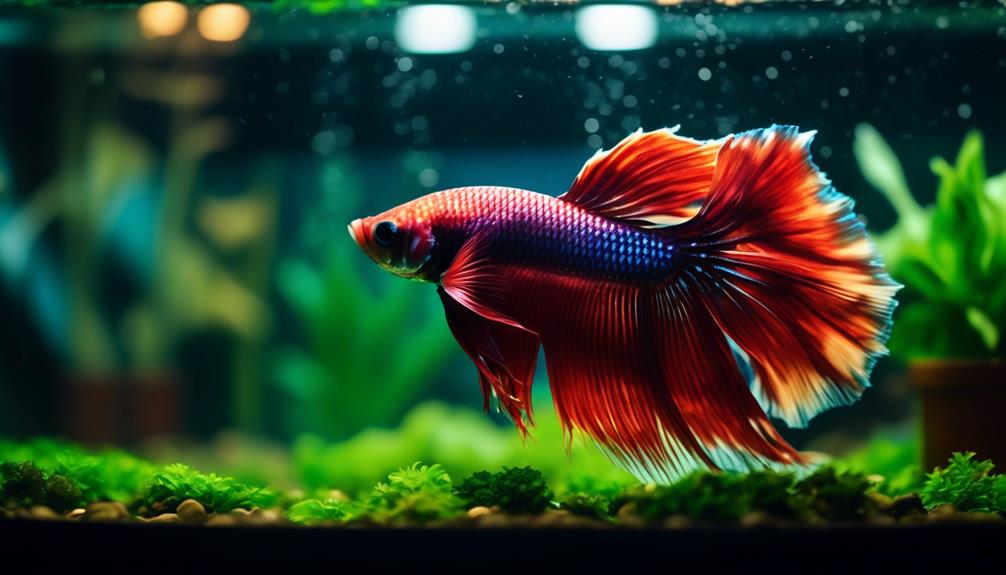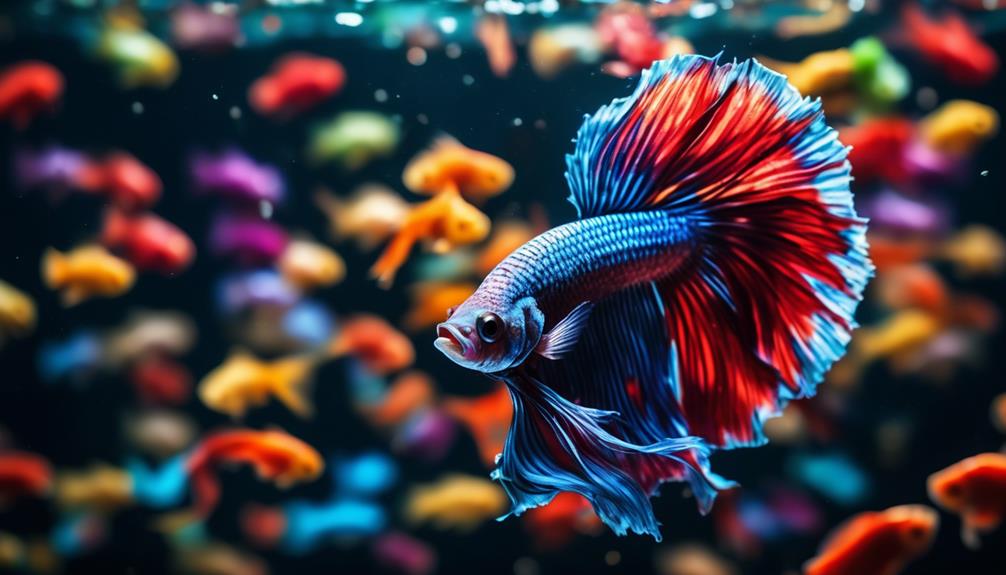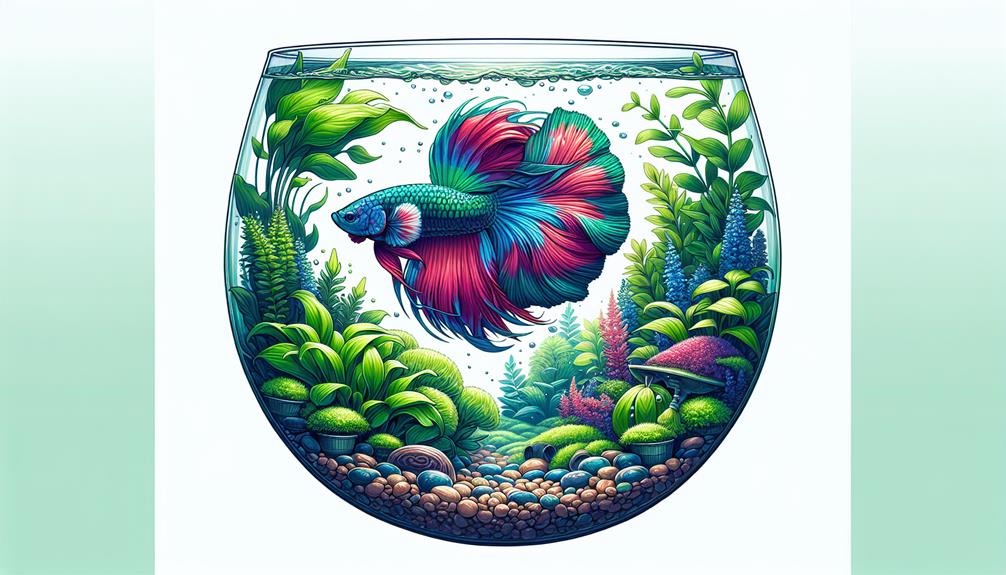When it comes to caring for betta fish, creating the perfect environment is crucial for their overall health and happiness. But what exactly are the secrets to a thriving betta fish tank?
How can you ensure that your aquatic companion not only survives but thrives?
In this article, we will uncover the essential elements that contribute to a successful betta fish tank. From the ideal tank size and setup to the importance of water conditioning, we will explore the key factors that play a role in creating an optimal living space for these captivating creatures.
So, if you're ready to unlock the secrets and provide the best care for your betta fish, then let's dive in!
Key Takeaways
- The recommended tank size for betta fish is at least 5 to 10 gallons, providing them with extra room for swimming and reducing the frequency of tank cleanings.
- Water conditioning is crucial to remove harmful substances like chlorine from tap water, ensuring the health and well-being of betta fish.
- A heater is necessary to maintain the ideal temperature of around 80°F for betta fish, as room temperatures in the United States are typically lower.
- Adequate filtration and surface agitation are important for betta tanks to prevent the formation of an oily film and improve water cleanliness and oxygenation, with gentle sponge filters being a popular choice for betta fish.
Tank Size and Setup
The recommended tank size for betta fish is at least 5 to 10 gallons, providing ample space for swimming and reducing the frequency of tank cleanings. This larger tank size allows betta fish to exhibit their natural behavior, such as exploring and flaring their fins. Additionally, a larger tank provides more stable water conditions, which is crucial for the health and well-being of betta fish.
When setting up a betta fish tank, it is important to consider the appropriate decorations and tank mates. Betta fish are known for their territorial nature and aggression towards other fish. Therefore, it is advisable to avoid keeping them with aggressive or fin-nipping tank mates. Instead, opt for peaceful, slow-moving fish that can coexist peacefully with betta fish.
As for tank decorations, it is recommended to include hiding spots, such as caves or plants, to provide a sense of security for the betta fish.
Water Conditioning for Betta Fish
To ensure the health and well-being of betta fish, proper water conditioning is essential. Water conditioner or dechlorinator should be used to make tap water safe for betta fish. Choosing the right water conditioner is crucial for providing a suitable environment for these delicate creatures. One highly recommended water conditioner is the Fritz Complete Water Conditioner. This product is specifically designed to remove chlorine and detoxify ammonia compounds, ensuring that the water is safe and healthy for betta fish.
The benefits of proper water conditioning are numerous. Firstly, it eliminates harmful substances, such as chlorine, that can be present in tap water and cause stress or even death to betta fish. Secondly, it helps to maintain a stable and optimal water quality, which is crucial for the overall health and vitality of the fish. Lastly, proper water conditioning promotes a thriving and vibrant betta fish tank, allowing these beautiful creatures to flourish in a clean and safe environment.
Importance of a Heater

Maintaining the ideal temperature for betta fish is crucial for their overall well-being, making a heater an essential component of their tank setup. Betta fish prefer temperatures around 80°F for optimal activity, but room temperatures in the United States are typically lower, causing betta fish to become lethargic and prone to illness.
A heated tank provides several benefits for betta fish. Firstly, it helps to regulate their metabolism, allowing them to digest food properly. Secondly, it promotes a healthy immune system, reducing the risk of diseases. Lastly, a heated tank enhances their coloration and overall appearance.
When choosing a heater for betta fish, it is important to consider the tank size and the heater's ability to maintain a stable temperature. Adjustable heaters with built-in thermostats are recommended to ensure precise temperature control.
Filtration and Surface Agitation
After understanding the importance of maintaining the ideal temperature for betta fish, it is essential to now focus on the crucial aspect of filtration and surface agitation in their tank setup. Proper filtration and surface agitation play a vital role in keeping the betta fish tank clean and oxygenated, ensuring the fish's well-being. Here are three key points to consider:
- Choosing the right filter: When selecting a filter for a betta fish tank, it is important to opt for a gentle option that doesn't create strong currents. Sponge filters are popular choices due to their gentleness, reliability, and ease of use. Alternatively, smaller adjustable flow rate filters can also be suitable.
- Benefits of live plants: Live plants not only enhance the aesthetic appeal of the tank but also provide numerous benefits for betta fish. They help to oxygenate the water, absorb excess nutrients, and provide hiding places for the fish. Additionally, live plants create a natural environment that reduces stress and promotes overall well-being for the betta fish.
- Maintenance and cleaning: Regular maintenance and cleaning of the filter are necessary to ensure its optimal performance. Filters should be cleaned and replaced as per the manufacturer's instructions to maintain proper filtration and surface agitation in the betta fish tank.
Feeding Schedule and Diet

Establishing a proper feeding schedule and providing a well-balanced diet is crucial for maintaining the health and vitality of betta fish. Betta fish should be fed once a day, allowing them to consume their food within one minute. Overfeeding can lead to swollen bellies and health issues such as constipation.
A balanced diet for betta fish includes betta fish pellets and freeze-dried bloodworms. These foods provide essential nutrients and meet the nutritional requirements of betta fish. It is important to add variety to their diet to ensure optimal health. Other recommended betta fish foods include brine shrimp, daphnia, and mosquito larvae.
These feeding techniques help mimic their natural diet in the wild and promote their overall well-being. Providing a well-balanced diet and adhering to a feeding schedule is essential in keeping betta fish healthy and thriving.
Frequently Asked Questions
How Often Should I Change the Water in My Betta Fish Tank?
The frequency of water changes in a betta fish tank depends on various factors, including tank size, filtration, and water quality. Generally, it is recommended to change 25-50% of the water weekly to maintain optimal tank conditions and ensure the health of the fish.
Can Betta Fish Live in a Bowl Without a Heater?
Betta fish cannot live in a bowl without a heater. They require a consistent temperature of around 80°F for optimal health. A proper betta fish habitat includes a heated tank to ensure their well-being.
Are Live Plants Necessary for a Betta Fish Tank?
Live plants are not necessary for a betta fish tank, but they offer numerous benefits. They provide oxygen, natural hiding spots, and help maintain water quality. If live plants are not desired, alternative tank decorations can be used.
Can Betta Fish Eat Tropical Fish Flakes?
Betta fish should not be fed tropical fish flakes as their primary diet. While they may eat them, betta fish require a specific diet that includes betta fish pellets and freeze-dried bloodworms for optimal health and nutrition.
How Do I Know if My Betta Fish Is Sick?
Betta fish diseases can manifest through various symptoms such as fin rot, ich, and dropsy. Prompt identification and treatment with appropriate medications are crucial. Regular water changes, proper nutrition, and maintaining optimal tank conditions are essential for preventing betta fish illnesses.
Conclusion
In conclusion, by applying the knowledge and practical tips outlined in this article, betta fish enthusiasts can create a thriving and stimulating environment for their beloved pets.
From ensuring the appropriate tank size and setup to providing proper water conditioning, heating, filtration, and feeding, betta fish owners can enhance the overall well-being of their aquatic companions.
By following these guidelines, betta fish can flourish, showcasing their vibrant colors and unique personalities.

